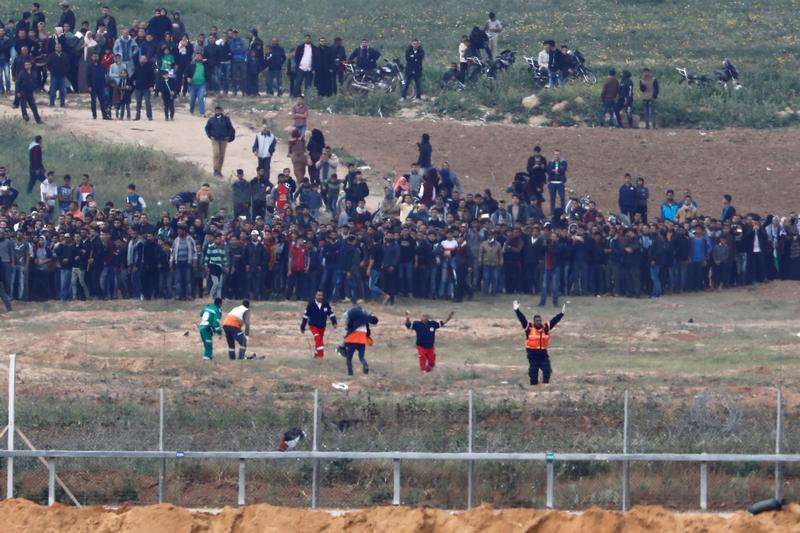The Gaza Blockade Is Illegal– And So Is the Use of Force to Maintain It
PALESTINE - ISRAEL, 16 Jul 2018
Norman G. Finkelstein | Mondoweiss – TRANSCEND Media Service

Palestinian paramedics evacuate an injured man on the Gaza side of the Israel-Gaza border, as seen from the Israeli side of the border, during March 30 Land Day demonstrations. © 2018 Reuters
7 Jul 2018 – Human Rights Watch (HRW) is among the leading guardians of human rights in the world. Sari Bashi is HRW’s Israel/Palestine Advocacy Director. She can lay claim to an impressive academic pedigree (BA, Yale; JD, Yale), and she co-founded the important Israeli human rights group Gisha. It thus cannot but depress that Bashi is so wanting in elementary moral and legal judgment when it comes to the people of Gaza.
Shortly after the Israeli massacre in Gaza on 14 May 2018, Bashi posted a commentary under the title, “Don’t Blame Hamas for the Gaza Bloodshed.”
Its essence is captured in the opening sentence: “Israel has a right to defend its borders, but shooting unarmed protesters who haven’t breached its frontier is disproportionate and illegal.” Insofar as the demonstrators didn’t pose an “imminent threat to life,” Bashi concludes, Israel had no right to use lethal force against them and, in any event, did not “exhaust” nonlethal means “such as tear gas, skunk water, and rubber-coated steel pellets” to throw back the assembled crowd.
The UN has pronounced Gaza unlivable, while Sara Roy of Harvard’s Center for Middle Eastern Studies has written, “Innocent people, most of them young, are slowly being poisoned by the water they drink.” Is it not a tad unseemly, not to say unsettling, for the representative of a respected human rights organization to coach Israel how to stay within the letter of the law—before resorting to bullets, you must first try “tear gas, skunk water, and rubber-coated steel pellets”—while it’s herding two million people, half of them children, in an unlivable space in which they are slowly being poisoned?
To be sure, Bashi is not oblivious to the humanitarian catastrophe in Gaza caused by Israel’s blockade. But she makes out no legal nexus between the effects of the siege and Israel’s right to use force. Instead, she dwells on the apparently paradoxical outcome that whereas Israel imposed the blockade to weaken Hamas, it has in fact “helped Hamas grow in strength.”
But the siege is not irrelevant to a legal determination of Israel’s right to use force—be it proportionate or disproportionate, moderate or excessive, lethal or nonlethal—to prevent demonstrators from breaching Gaza’s perimeter fence. For brevity’s sake, I would want to touch here on one basic, uncontroversial point. (A forthcoming article by Jamie Stern-Weiner and this writer parses the more nuanced legal issues.)
It is a tenet of international law that no state can resort to forceful measures unless “peaceful means” have been exhausted (UN Charter, Article 2). This principle is as sacred to the rule of law as the analogous Hippocratic Oath, primum non nocere (first, do no harm), is to medicine. Now consider the situation in Gaza. Nearly all competent observers agree:
- Israel has imposed an illegal blockade on Gaza;
- The illegal blockade has created a humanitarian catastrophe;
- The impetus behind the protests at the perimeter fence is the illegal blockade, and their objective is to end it.
It is to be noted that even Israeli prime minister Benjamin Netanyahu concedes the last bullet point. “They’re suffocating economically,” he observed, “and therefore they decided to crash into the fence.”
If Israel wants to protect its border, then it need not resort to either lethal or nonlethal coercion. It merely has to lift the siege. Israel’s refusal to take this preliminary peaceful step puts it in double breach of international law: the imposition of an illegal blockade and the unlawful resort to armed force when peaceful means have not been exhausted.
It is cause for wonder why Bashi doesn’t see that Israel’s resort to any force against Gaza demonstrators cannot be legally justified. It is cause for dismay that she counsels Israel to use nonlethal repression in order to corral Gaza’s inhabitants in a hellhole, instead of counseling it, not just as a matter of political expedience but also as a matter of law, to end the siege. If, by way of comparison, police repeatedly enter a man’s premises in flagrant violation of the law, the homeowner finally resists, and the police try to subdue him, would a human rights representative be advising the officers to use graduated force?
Indeed, prior to Israel’s slated violent eviction/demolition of the Bedouin village Khan al-Amar in the West Bank, HRW itself did not recommend that the army first use “tear gas, skunk water, and rubber-coated steel pellets” but, on the contrary, bluntly warned Israel that such an act would constitute a “war crime.”
Were the siege of Gaza lifted, it would put Israel on the right side of the law as it yielded the double dividend of enabling the people of Gaza to breathe and terminating the purported threat to Israel’s border. In other words, it would render all talk of force superfluous.
_____________________________________________
 Norman G. Finkelstein received his doctorate in 1988 from the Department of Politics at Princeton University. He taught political theory and the Israel-Palestine conflict for many years and currently writes and lectures. Finkelstein’s books have been translated into 50 foreign editions. His latest is Gaza: An Inquest into Its Martyrdom (University of California Press, January 2018).
Norman G. Finkelstein received his doctorate in 1988 from the Department of Politics at Princeton University. He taught political theory and the Israel-Palestine conflict for many years and currently writes and lectures. Finkelstein’s books have been translated into 50 foreign editions. His latest is Gaza: An Inquest into Its Martyrdom (University of California Press, January 2018).
Go to Original – mondoweiss.net
Join the BDS-BOYCOTT, DIVESTMENT, SANCTIONS campaign to protest the Israeli barbaric siege of Gaza, illegal occupation of the Palestine nation’s territory, the apartheid wall, its inhuman and degrading treatment of the Palestinian people, and the more than 7,000 Palestinian men, women, elderly and children arbitrarily locked up in Israeli prisons.
DON’T BUY PRODUCTS WHOSE BARCODE STARTS WITH 729, which indicates that it is produced in Israel. DO YOUR PART! MAKE A DIFFERENCE!
7 2 9: BOYCOTT FOR JUSTICE!
DISCLAIMER: The statements, views and opinions expressed in pieces republished here are solely those of the authors and do not necessarily represent those of TMS. In accordance with title 17 U.S.C. section 107, this material is distributed without profit to those who have expressed a prior interest in receiving the included information for research and educational purposes. TMS has no affiliation whatsoever with the originator of this article nor is TMS endorsed or sponsored by the originator. “GO TO ORIGINAL” links are provided as a convenience to our readers and allow for verification of authenticity. However, as originating pages are often updated by their originating host sites, the versions posted may not match the versions our readers view when clicking the “GO TO ORIGINAL” links. This site contains copyrighted material the use of which has not always been specifically authorized by the copyright owner. We are making such material available in our efforts to advance understanding of environmental, political, human rights, economic, democracy, scientific, and social justice issues, etc. We believe this constitutes a ‘fair use’ of any such copyrighted material as provided for in section 107 of the US Copyright Law. In accordance with Title 17 U.S.C. Section 107, the material on this site is distributed without profit to those who have expressed a prior interest in receiving the included information for research and educational purposes. For more information go to: http://www.law.cornell.edu/uscode/17/107.shtml. If you wish to use copyrighted material from this site for purposes of your own that go beyond ‘fair use’, you must obtain permission from the copyright owner.
Read more
Click here to go to the current weekly digest or pick another article:
PALESTINE - ISRAEL:
